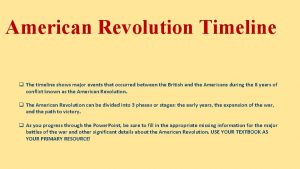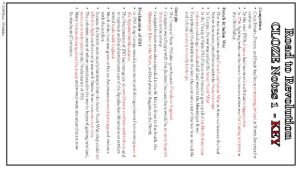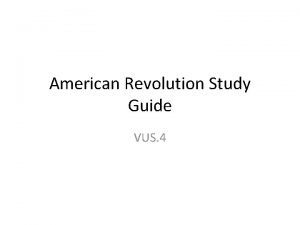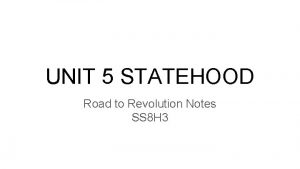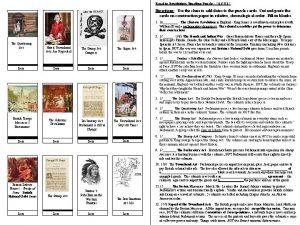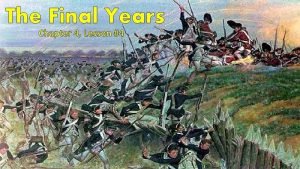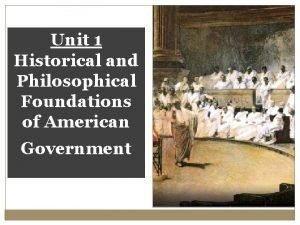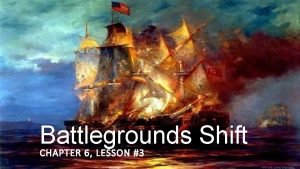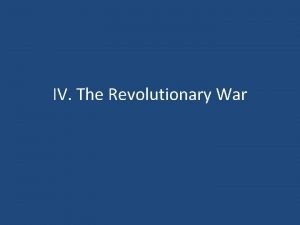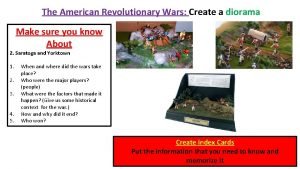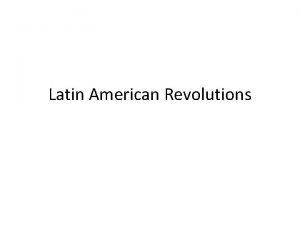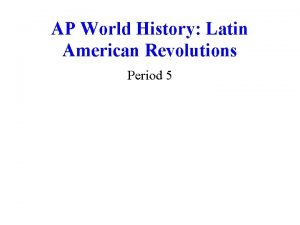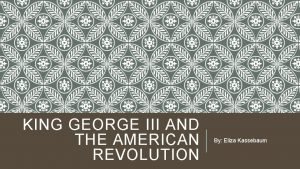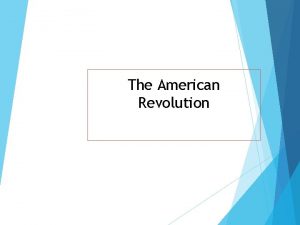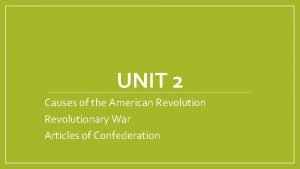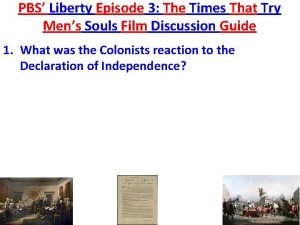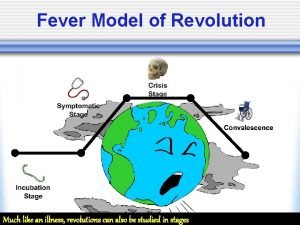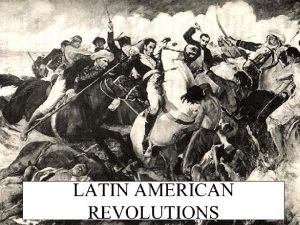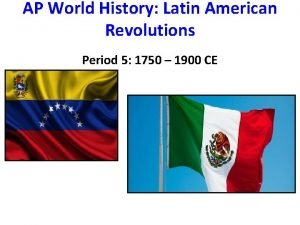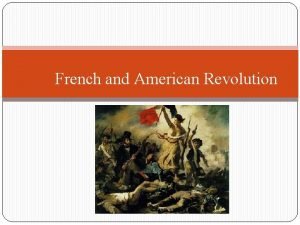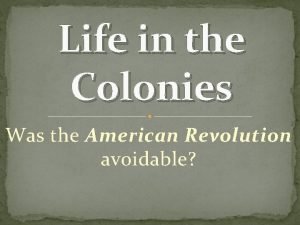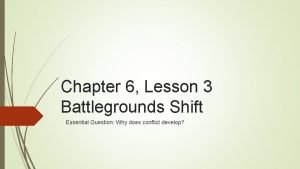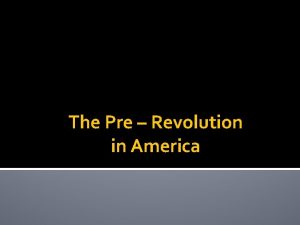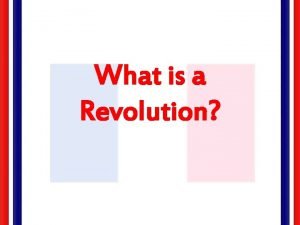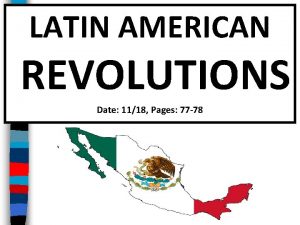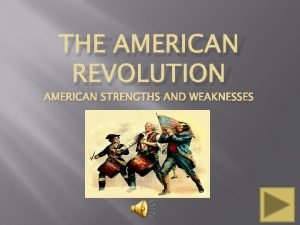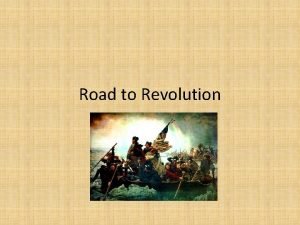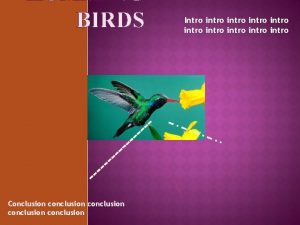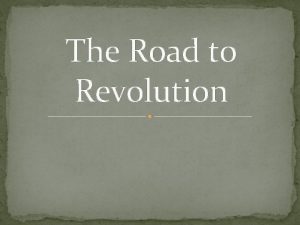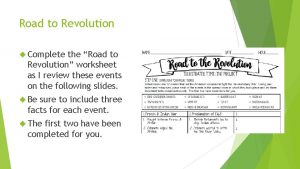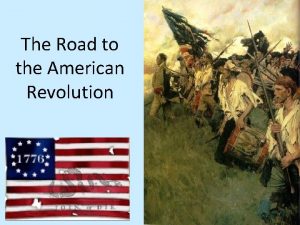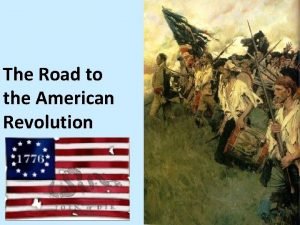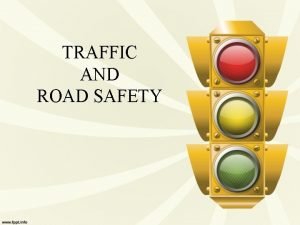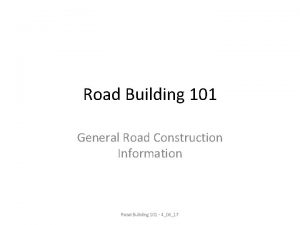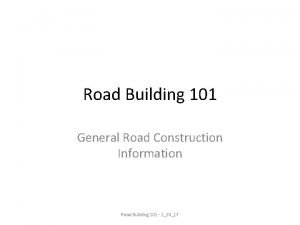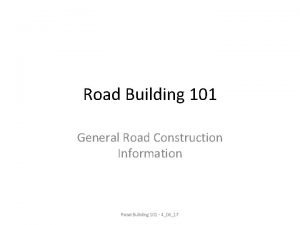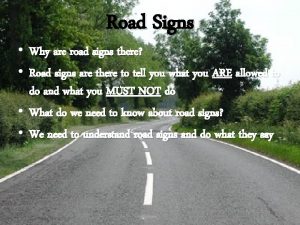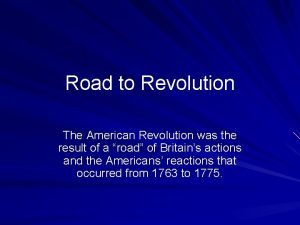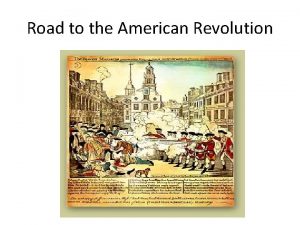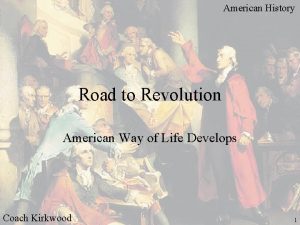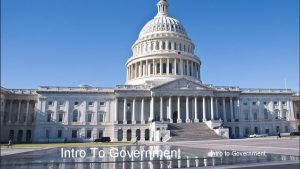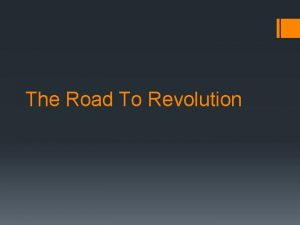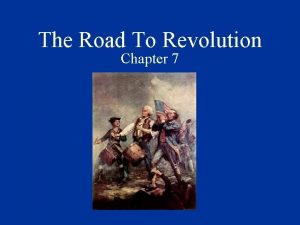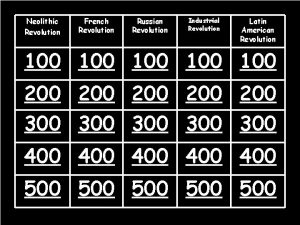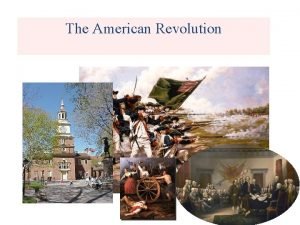American Revolution Road to Revolution American Revolution Intro




































- Slides: 36

American Revolution Road to Revolution

American Revolution • Intro: • This portion will specifically focus on major events that led to the revolution (Change in British policy, new rules/taxes, protest movements) • Intellectual v. Economic origins of Revolution (Can books/ideas cause revolutions? ) • Revolution from the top v. Revolution from below • The War/Aftermath • Was it really a revolution? (Decolonization, solely political rev)

Discussion Question • What was a benefit to the Colonists from the French and Indian War?

French and Indian War • Why am I talking about this again? • Effects: (reminder) • France out of North America (keep islands off Newfoundland West Indies) • Treaty of Paris (1763) • Great Britain claimed all of North America east of the Mississippi River including Florida which was owned by Spain (an ally of France) • Spain gained the French lands west of the Mississippi including the city of New Orleans • Identity • British incur huge debts; look to colonies for help (TROUBLE) • It was, in a major way, a warm-up for the revolution. Let’s see how

French and Indian War • The colonists participated in this war in a major way. First time that. . . • Ex. George Washington, how he initially becomes famous (though he stunk it up!) • Colonial Unity? • The Colonies were not unified because … • Different cultures, economies, religions, geography, transportation issues • Albany Plan of Union –What was it? • Representatives of 7 out of the 13 colonies showed up and all the colonies north of VA unify (first time anything like this happened in colonies) • Iroquois tribe

French and Indian War • Join or Die! • Franklin drew this image to encourage people in the colonies to unite • The cartoon was inspired by superstitions that a sliced snake would revive if the pieces of the body were joined before sunset

French and Indian War • Colonial gains from the war: • • Self confidence The need for colonial unity No need for English … They no longer see … • Interactions between English and Colonists: • The English viewed the colonists as … • The Colonists viewed the English … • British stationed troops in territories to control Native Americans • Colonist thought the Native Americans might turn on them • This cost them a lot of money

Pontiac’s rebellion and The Proclamation of 1763 • Native Americans feared … • would drive away the game they depended on • Spring 1763, Pontiac (Ottawa leader) • To avoid further conflict, British gov’t • British colonists resented being told they could not settle in land they had just fought for and they largely ignored the law.


Changes in British Policy • Remember: The 7 Years war cost Britain a TON of money. Need to make it up somehow. • The colonists were left too much on their own • Britain is regretting Salutary Neglect • Colonists are creating their own gov’t, religion, and economy apart from Britain • The colonists didn’t help enough with the war effort • Taxed…

Changes in British Policy • Salutary Neglect comes to an end. • Pattern of Britain imposing new taxes to raise funds to: • Protect the colonists (keeping troops in Americas) • Make up for debt incurred from 7 years war. • Lessen tax burden on those of mother country • In response, colonists protested through: • Crowd action/peaceable protests • Mob violence • Boycotts • Outright refusal

Discussion Question • Why do you think the colonists were so upset about these taxes being implemented by the British government?

Taxation and Representation • From the colonists’ perspective (some of them at least) it wasn’t about paying taxes, it was about the right to tax. How can they say this? • American leaders viewed the British empire as. . . • To the British government, Colonies still part of the British Empire!! As such. . . • Britain changes policy, but

Sugar Act- 1764 • British imposed a tax on importing sugar-based products such as? Why? • threatened the profits of colonial merchants (greatly impacted Rum manufacturing in colonies) and aggravated an economic recession. • Restricted free trade • In response the colonists began … • Also would protest (through various ways) this act. Examples?

Quartering Act (1765) • Colonist were forced to house and feed British troops • From the British perspective • To the Colonists • Protest this act by…what does England do

Stamp Act 1765 • A direct tax on all sorts of printed materials, including wills, newspapers, playing cards, marriage licenses • The act was. . . • Opposition to the Stamp Act was the first great drama of the Revolutionary era and the first • The Sons of Liberty • Led (in Boston) by Samuel Adams • Where crowd violence was much more common and wide spread

Stamp Act Crisis • Crowd action against tax collectors, would often turn violent. • Case in point: Boston

Stamp Act Crisis • The Stamp Act Congress met in 1765 to endorse Virginia’s House of Burgesses’ resolutions. • Supported by ? • Resolutions stated: colonists enjoyed the same “liberties, privileges, franchises, and immunities” as those of the mother country (where we get “not taxation without representation”). • Still careful to • Merchants throughout the colony did what? British response? • First major cooperative action by the North American colonies.

Declaratory Acts 1766 • Stamp Act repealed, largely due … • Pass the Declaratory Acts • A Response to the colonists assertion that Parliament does not have the right to tax the colonies due lack of representation. • Parliament’s authority is the same in colonies as it is in mother country. British Empire not a confederacy of equals, idea of virtual representation • Largely ignored by colonists why?

Townshend Acts -1767 • The 1767 Townshend Act imposed taxes on imported goods. • Also allowed the British to inspect incoming ships for illegal or smuggled goods. • By 1768 colonies were again boycotting British goods. British troops were sent to help enforce the laws, Colonists held public protestssome became violent

Homespun Movement • What is it? • use of American goods came to be seen as a symbol of American resistance. • Urban artisans strongly supported the boycott. • Textile Weaving groups formed by women in Colonial America. • More than 1600 women participated

Boston Massacre- 1770 • Turning Point! • The March 1770 conflict between Bostonians and British troops left five Bostonians, including a mixed-race sailor named Crispus Attucks (a former slave), dead. • Colonists were angry with the British soldiers • Not clear • The boycott ended after • Paul Revere’s picture of the event stirs colonists anger against Britain. Taxes lowered and some soldiers removed- things calmed down for a bit



Tea Act- 1773 • The East India Company was in financial crisis, and the British government decided to market the company’s Chinese tea in North America. • The Tea Act was intended to aid the East India Company and to help defray the costs of colonial government. • Enraged colonial merchants because it undercut their business

Boston Tea Party 1773 • Colonists refused to unload the British tea from ships in the harbor, British say they must. • That evening, a group of 30 to 130 men, some dressed in the Mohawk warrior disguises, boarded the three vessels and, over the course of three hours, dumped all 342 chests of tea into the water • Britain got Real SALTY this time…. . Real Salty


Coercive acts (Intolerable Acts) • In response to the Tea Party (and other colonial protest movements) Britain passed a series of laws: • Makes colonist pay for tea that was lost • Martial law- strengthened Quartering Act • Boston Port Bill: Effective June 1, 1774 This bill closed the port of Boston to all colonists until, the damages from the Boston Tea Party were paid for. • Administration of Justice Act: Effective May 20, 1774 This bill stated that British Officials could not be tried in provincial courts for capital crimes. They would be extradited back to Britain and tried there. This effectively gave the British free reign to do whatever they wished, because no justice would be served while they were still in the colonies.

Quebec Act

Coercive acts (Intolerable Acts) • Massachusetts Government Act: Effective May 20, 1774 This bill effectively annulled the charter of the colonies, giving the British Governor complete control of the town meetings, and taking control out of the hands of the colonialists. • Quebec Act: Established May 20, 1774 This bill extended the Canadian borders to cut off The western colonies of Conn. Mass. and Va. • Also gave freedom of worship to Catholics in Canada. • Other colonies began to help the people of Boston • Organized protest to Acts all over- “if it can happen in Boston, it could happen to my colony” • Committee of Correspondence established colonial unity • First Continental Congress meets

First Continental Congress-1774 • In response to Intolerable Acts and to begin to communicate and work together, colonists from 12/13 colonies meet to support the protests in Massachusetts and organize boycotts and protests across the colonies. • Who was missing? ? Why? • What does the Congress do? • This is the FIRST time the colonies had met together as a group to coordinate action. The delegates …

First Continental Congress • The Congress adopted the Continental Association, which called for an almost complete halt to trade with Great Britain and the West Indies. • Committees of Safety were established to enforce the boycotts. • The Committees of Safety enlarged the political nation.

Lexington and Concord • British troops marched to Lexington and Concord (towns near Boston) and are surprised by the militia (Minutemen) and fight a small battle-forced to retreat. April of 1775 • Goal was to arrest Sam Adams and John Hancock (leaders of the SOL) and to take the militia’s weapons • “Shot heard ‘rond the world”“start of the Revolution”


Second Continental Congress • Colonial leaders met again (all present this time) in summer of 1775 in response to the growing crisis. • Still trying to. . . • Sent Olive Branch Petition to King George • He ignored it. Congress response? • They start to plan for war when?

Independence? • That the goal of this war was independence was not clear by the end of 1775. • Opinions varied in the colonies as to the question of independence. • Keep in mind, this was after Lexington and Concord, where large percentages of the population desired to remain loyal to Britain or were unsure of what to do. • Would take convincing for many to come to the side of independence…. . • Enter…. Thomas Paine
 Road to american revolution timeline
Road to american revolution timeline Paved road vs unpaved road
Paved road vs unpaved road How could the french revolution have been avoided
How could the french revolution have been avoided Colonial georgia cloze notes
Colonial georgia cloze notes American revolution study guide answer key
American revolution study guide answer key American revolution cloze notes 1
American revolution cloze notes 1 Road to revolution timeline answers
Road to revolution timeline answers Modern commercial agriculture
Modern commercial agriculture Russian revolution vs french revolution
Russian revolution vs french revolution American revolution interactive notebook
American revolution interactive notebook The american revolution lesson 4 the final years
The american revolution lesson 4 the final years Philosophical foundations of the american revolution
Philosophical foundations of the american revolution Lesson 3 battlegrounds shift
Lesson 3 battlegrounds shift The american revolution chapter 6 section 4
The american revolution chapter 6 section 4 American revolution strengths and weaknesses
American revolution strengths and weaknesses Revolutionary war diorama
Revolutionary war diorama Latin american revolution
Latin american revolution Latin american revolution definition ap world history
Latin american revolution definition ap world history Who was the king during the american revolution
Who was the king during the american revolution 10 uncomfortable truths about the american revolution
10 uncomfortable truths about the american revolution Chapter 6 section 4
Chapter 6 section 4 Causes of the american revolutionary war
Causes of the american revolutionary war Latin american revolution vocabulary
Latin american revolution vocabulary Liberty the american revolution episode 3
Liberty the american revolution episode 3 Russian revolution fever model
Russian revolution fever model Revolutionary war choice board
Revolutionary war choice board Causes of latin american revolution
Causes of latin american revolution Jose de san martin definition world history
Jose de san martin definition world history American revolution effects
American revolution effects Was the american revolution avoidable
Was the american revolution avoidable Guided reading lesson 3 battlegrounds shift
Guided reading lesson 3 battlegrounds shift May 1775
May 1775 Symptomatic stage of american revolution
Symptomatic stage of american revolution Latin american revolutions date
Latin american revolutions date King during american revolution
King during american revolution Mga pamana ng sinaunang pilipino
Mga pamana ng sinaunang pilipino American revolution strengths and weaknesses
American revolution strengths and weaknesses
